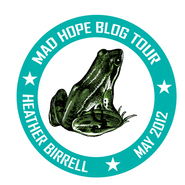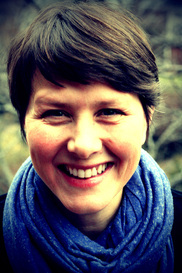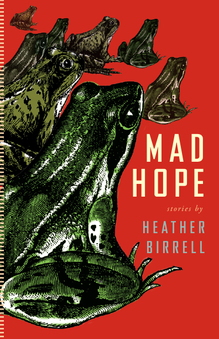 Heather Birrell is the author of the previous short story collection, I know you are but what am I? (Coach House, 2004). Her work has been honoured with the Journey Prize for short fiction and the Edna Staebler Award for creative non-fiction, and has been shortlisted for both National and Western Magazine Awards. Birrell's stories have appeared in many North American journals and antholoiges, including Prism International, The New Quarterly, Descant, Matrix and Toronto Noir. She lives in Toronto with her husband and two daughters where she also teaches high school English.  Heather Birrell Photo by Charles Checketts RUSTY TALK WITH HEATHER BIRRELL Kathryn Mockler: What is your first memory of writing creatively? Heather Birrell: I don’t know that I have a first memory of writing creatively although I certainly have some evidence of it. My grade one teacher put together a mimeographed anthology of stories based on Rudyard Kipling’s Just So stories—and I think mine was about why/how the camel got his hump. And I still have the book I was sent as a prize for being a runner-up in an OWL magazine story contest when I was ten. I do remember making up a lot of stories with my sister—I think an inordinate number of them were spin-offs from Annie, The Musical. We were obsessed with that movie and played the soundtrack incessantly. Then I also have diaries full of teen angsty poetry. It’s amazing how many times a person can use the word depressed in one sentence. KM: What keeps you going as a writer or why do you write? HB: I write because the world is a confusing, sad, beautiful place, and there are some amazing, complicated humans living in it. And I guess I feel some pressing need to communicate that to other people. It’s that drive to connect that really keeps me going—especially when my energy is low, or it seems like people don’t appreciate what I’m doing. And I also write because I’ve been doing it for a while now, and I’m getting better at it, but it never stops presenting me with new challenges. It feels like a passion without an expiry date. KM: Could you describe your writing process? HB: I have two small children (3 1/2 and 9 months) so it is pretty much impossible for me to write every day. I also have a full-time day job as a high school teacher (although I am on maternity leave right now), so my time really is at a premium. When I do get time I tend to be fairly focused, mostly because the time is so limited and circumscribed. I prefer to write in the morning—although I find coffee helps create morning-like conditions at other points in the day—and I can only create new work in a notebook, pen to paper. If I have a tricky scene to write, I often use timed writing to force me to confront the problem. I do most of my edits on the computer, then print out drafts and edit some more on the page. I have two pieces of conflicting advice for aspiring writers about the writing time/paying work conundrum: 1. Quit your day job. 2. Don’t quit your day job. I spent many years doing jobs here and there—temping, teaching ESL part-time, freelancing, housesitting—so that I would have time to write, so that I would have the freedom required to dream up stories. But then the stress of not having a steady pay cheque started to impede my creativity and eat up a lot of mental space. I needed a steady job so I could feel safe enough to create. Your life will change and your writing needs will change too—be fearless and be open, but make sure there are enough coins in the coffers to pay for a roof over your head and the occasional visit to the dentist. KM: Rejection or criticism can often stop writers before they start. Do you have any advice on how to deal with rejection? HB: Have people around you who understand that your writing is important to you and that rejection is hard—get them to give you hugs. The writer Judy Fong Bates once told me that a writer can’t afford to be thick-skinned—we have to be able to absorb experience to write about it—so I started trying to cultivate a rejection-resistant rather than a rejection-proof outer layer. If you are offered constructive criticism, take it as a compliment—an editor has taken time and effort because they see something worthwhile in your work. If your work is rejected outright do not see this as a sign to stop writing—see it as a sign to improve your work, to send it out again, to the same places and to different ones. Believe in your project to the point where you want badly to make it better, the best it can be. Celebrate your successes, however small. Take yourself seriously but not too. KM: What writers would you recommended to an aspiring writer? Or what writers were influential to you when you first started out? HB: When I first started writing stories I adored Lorrie Moore; she seemed different to me, less staid, than any other story writers I had ever read—and funny! I also couldn’t get enough of AL Kennedy—I so admired her bravery and sense of humour. It is really exciting to discover writers who challenge me and give permission to try new things or open up in different ways—this doesn’t change. No matter how accomplished, a writer always needs to feel uplifted, spurred on, astonished by fantastic writing! Recently, my inspirations have been Deborah Eisenberg, Amy Bloom, Mary Gaitskill. But I also get jazzed by great essays in periodicals or a wonderful film or song lyric. KM: Your funniest literary moment? HB: Hmm. I did a reading with Darren O’Donnell (playwright, novelist, provocateur, fellow Coach House writer) once. He was up right before me and stripped naked in the course of his reading. How to follow that? It was terrible. And funny, maybe. In retrospect. KM: Can you tell us about your new book Mad Hope? HB: Oh dear. This is my least favourite part of promoting a collection of stories—trying to answer the question What is your book about? It’s so hard for me to have any distance, and then when I do try to describe the stories, I always feel I’m missing something integral. It seems self-serving to tell people to just go read the book (but please do!), so I’ll cobble something here: Though the characters in Mad Hope—their settings and situations—are varied, the stories connect in that they concern people coming through loss with some notion that things will get better, that they will endure. This the 'Mad Hope' of the title. I'd say they're also about family, in their various forms—people struggling to build new families and often failing, people living in atypical families, people whose families are falling apart or are estranged. But again, there are moments of true connection between friends and family members, a measure of catharsis. And there are frogs on the cover! KM: What are you working on now? HB: I have some bits and pieces that might become stories. And a draft of a novel that I would like to make less draft-y. I’m also working on an essay for an upcoming anthology edited by the wonderful Kerry Clare of the excellent book blog Pickle Me This. And I’m working on some kind of workable balance between parenting and writing!  HEATHER BIRRELL'S MOST RECENT BOOK OF SHORT FICTION Mad Hope, Coach House Books, 2012 About Mad Hope In the stories of Mad Hope, Journey Prize winner Heather Birrell finds the heart of her characters and lets them lead us into worlds both recognizable and alarming. A science teacher and former doctor is forced to re-examine the role he played in Ceauşescu’s Romania after a student makes a shocking request; a tragic plane crash becomes the basis for a meditation on motherhood and its discontents; women in an online chat group share (and overshare) their anxieties and personal histories; and a chance encounter in a waiting room tests the ties that bind us. Using precise, inventive language, Birrell creates astute and empathetic portraits of people we thought we knew – and deftly captures the lovely, maddening mess of being human. 'This is a beautiful book: funny, whip-smart, compassionate, and gorgeously written. Heather Birrell belongs in the short story pantheon with Alice Munro, Lisa Moore, and Zsuzsi Gartner.' – Annabel Lyon
|
Rusty Talk
Rusty Talk Editor: Archives
November 2017
Categories
All
|

 RSS Feed
RSS Feed
